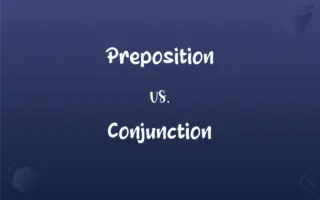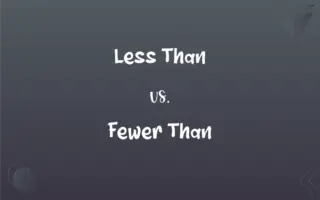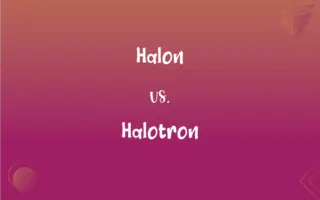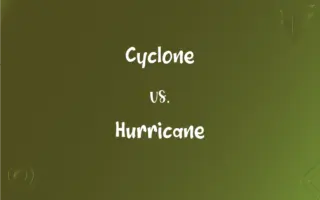CDMA vs. WCDMA: What's the Difference?
Edited by Aimie Carlson || By Janet White || Updated on November 22, 2023
CDMA (Code Division Multiple Access) is a digital cellular technology using code division to allow multiple users on the same channel, while WCDMA (Wideband CDMA) is a CDMA version that uses a wider bandwidth.
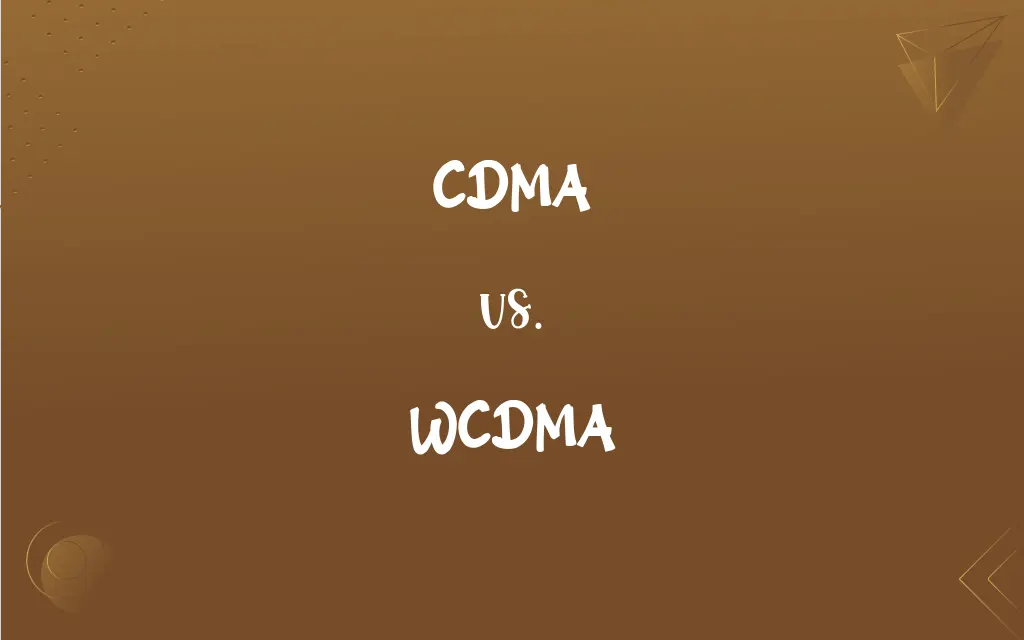
Key Differences
CDMA uses unique codes to differentiate between multiple transmissions over a single channel, allowing simultaneous data and voice communication. While, WCDMA, an evolution of CDMA, uses a wider frequency band to increase data transmission speed and capacity.
Developed for 2G networks, CDMA efficiently utilizes bandwidth and provides high communication security. However, WCDMA, designed for 3G networks, offers higher data rates and supports more advanced services like video calling.
CDMA's spread-spectrum technology makes it less prone to interference and eavesdropping. Whereas ,WCDMA, with its wider bandwidth, improves upon CDMA by offering better audio quality and Internet performance.
CDMA's network architecture supports a large number of users with minimal signal degradation. Meanwhile, WCDMA provides increased data transmission capacity, making it suitable for high-speed mobile internet services.
CDMA was a breakthrough in digital wireless technology, while WCDMA represents a shift towards unified and high-speed global wireless standards, aligning more closely with international mobile telecommunication standards.
ADVERTISEMENT
Comparison Chart
Technology Basis
Code division for multiple access
Wideband version of CDMA
Network Generation
Primarily 2G
Primarily 3G
Bandwidth
Standard bandwidth
Wider bandwidth for higher data capacity
Data Speed
Lower compared to WCDMA
Higher data transmission speeds
Main Advantage
Efficient bandwidth utilization, secure
Higher capacity, better for high-speed data
ADVERTISEMENT
CDMA and WCDMA Definitions
CDMA
CDMA is a multiple access method used in wireless and mobile communications.
The advent of CDMA marked a significant advancement in mobile network technology.
WCDMA
WCDMA stands for Wideband Code Division Multiple Access, a 3G mobile telephony standard.
WCDMA was a key component in the global transition to 3G networks.
CDMA
CDMA utilizes a spread-spectrum technique for secure and efficient communication.
CDMA's spread-spectrum technology enhances the security of mobile conversations.
WCDMA
WCDMA, a broadband version of CDMA, supports higher capacity and advanced services.
The introduction of WCDMA revolutionized mobile video streaming.
CDMA
In CDMA, each signal is spread over a wide frequency range, reducing interference.
CDMA's wide frequency range makes it resilient to signal jamming.
WCDMA
WCDMA is a 3G wireless standard expanding CDMA bandwidth for faster data rates.
WCDMA networks enabled faster internet speeds on mobile devices.
CDMA
CDMA is a digital wireless technology using unique codes for multiple user access.
Cellular providers adopted CDMA to maximize the use of their bandwidth.
WCDMA
WCDMA improves upon CDMA technology, offering enhanced voice and data services.
WCDMA significantly improved the quality of voice calls and data transmission.
CDMA
CDMA allows simultaneous data and voice transmission over a single channel.
With CDMA, several users can share a channel without significant interference.
WCDMA
WCDMA uses a wider frequency band than CDMA, resulting in better performance.
WCDMA's wider bandwidth allows for more efficient use of the radio spectrum.
FAQs
How does CDMA work?
CDMA uses unique codes to differentiate users on the same channel for simultaneous communication.
Which generation networks use CDMA?
CDMA is primarily used in 2G networks.
What does WCDMA stand for?
WCDMA stands for Wideband Code Division Multiple Access.
Can CDMA and WCDMA coexist in the same network?
They are different standards, typically not used simultaneously in the same network.
What is CDMA?
CDMA is a digital cellular technology using code division for multiple access.
How does WCDMA improve upon CDMA?
WCDMA offers higher data rates and supports more advanced services than CDMA.
What is the key feature of WCDMA?
WCDMA uses a wider bandwidth for higher data transmission speed and capacity.
Is WCDMA compatible with 3G networks?
Yes, WCDMA is designed for 3G networks.
Is CDMA still in use?
CDMA is still in use, but it's being gradually replaced by newer technologies.
Does WCDMA support international roaming?
Yes, WCDMA's global standardization supports international roaming.
What is the future of WCDMA?
WCDMA continues to evolve, integrating with newer 4G and 5G technologies.
Can CDMA support high-speed internet?
CDMA supports internet access but at lower speeds compared to WCDMA.
What is the major difference between CDMA and WCDMA?
The major difference lies in bandwidth usage and data transmission speed.
Can I use a CDMA phone on a WCDMA network?
This usually isn't possible due to different technology standards.
What are the advantages of CDMA?
CDMA offers efficient bandwidth utilization and high communication security.
How does WCDMA affect call quality?
WCDMA improves call quality due to its wider bandwidth and advanced technology.
How does CDMA impact battery life?
CDMA technology is generally efficient, potentially leading to longer battery life.
What type of services does WCDMA support?
WCDMA supports high-speed data services and advanced features like video calling.
Are CDMA phones compatible with WCDMA networks?
Typically, they require different hardware and are not directly compatible.
Is WCDMA better than CDMA?
WCDMA is considered more advanced, especially for high-speed data and 3G services.
About Author
Written by
Janet WhiteJanet White has been an esteemed writer and blogger for Difference Wiki. Holding a Master's degree in Science and Medical Journalism from the prestigious Boston University, she has consistently demonstrated her expertise and passion for her field. When she's not immersed in her work, Janet relishes her time exercising, delving into a good book, and cherishing moments with friends and family.
Edited by
Aimie CarlsonAimie Carlson, holding a master's degree in English literature, is a fervent English language enthusiast. She lends her writing talents to Difference Wiki, a prominent website that specializes in comparisons, offering readers insightful analyses that both captivate and inform.
